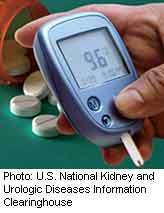(HealthDay)—Treatment escalation options have different efficacy following failure of exenatide or glimepiride added to metformin in patients with type 2 diabetes mellitus, according to a study published online April 1 in Diabetes, Obesity and Metabolism.
Guntram Schernthaner, M.D., from Rudolfstiftung Hospital in Vienna, and colleagues assessed third-line thiazolidinedione or glimepiride therapy in 144 patients inadequately controlled on metformin + exenatide twice daily, and third-line exenatide twice daily in 166 patients inadequately controlled on metformin + glimepiride. The authors assessed changes in hemoglobin A1c (HbA1c), body mass index (BMI), lipids, hypoglycemia, and vital signs.
The researchers found that add-on thiazolidinedione decreased HbA1c significantly better than add-on glimepiride among patients inadequately controlled on metformin + exenatide (130-week difference, 0.48 percent; P = 0.001), but there were significant increases in BMI and systolic blood pressure. For add-on glimepiride to add-on thiazolidinedione, the ratio of documented systolic hypoglycemia rates was 8.48 (P < 0.0001). There was a significant reduction in HbA1c and BMI at 130 weeks with add-on exenatide after metformin + glimepiride, with an increased rate of documented symptomatic hypoglycemia from metformin + glimepiride (ratio, 1.49).
"Future studies should examine various other potential treatment combinations, doses, and sequences to help define optimal triple therapy," the authors write.
The study was funded by Amylin and Eli Lilly. Several authors and editors disclosed financial ties to these companies as well as Bristol-Myers Squibb and Astra Zeneca.
More information:
Abstract
Full Text (subscription or payment may be required)
Copyright © 2015 HealthDay. All rights reserved.




















